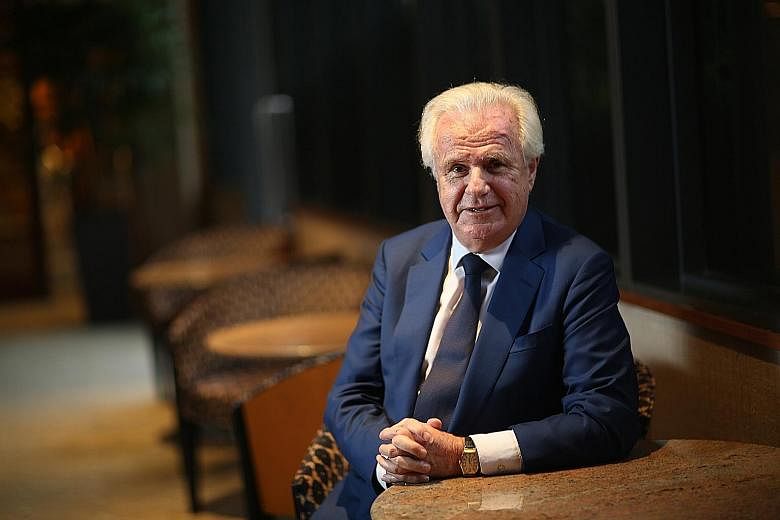British politician and business figure Paul Myners has faced many challenges in a glittering career, but the ones posed by Brexit and the Trump presidency are proving more testing than most.
The former Financial Services secretary and chairman of retail giant Marks & Spencer has worked for most of his life in an open financial and business world, but that world now seems under threat.
He told The Straits Times: "I am an internationalist and a liberal looking at a world that is now focusing more on national borders, a world where the United States President does not seem to sign up for the global agreement of nation states working together, and with Britain turning its back to its nearest neighbours.
"And this makes me unhappy because the direction of travel is not one the world has gone for the most of my career and one that I firmly support."
But the 69-year-old, who is also a member of the House of Lords with the title of Baron, sees no other way forward than to persevere, both in the British Parliament and his recently appointed role as the vice- chairman of Global Counsel.
He believes Global Counsel, a consulting firm on policy and regulatory risks, will do more to help companies and investors navigate the choppy waters of populist politics across the world.
Many people in the region - which Global Counsel serves out of its Singapore office - are trying to make sense of what has occurred in Britain, long a favoured destination to live, study, work and invest.
"We have recently done a study for South-east Asian investors on the future of student accommodation in Britain, focusing on non-European Union students and whether they will continue to be included in the migration figures," he noted.
"In Singapore, we also have a number of clients hoping to find out, for instance, how Brexit will affect real estate prices because it seems the decline of sterling has made properties in Britain more attractive."
The British pound has held steady after it crashed following the Brexit vote in June last year, but remains at record low levels of around 1.80 against the Singapore dollar.
Whatever gains Brexit offers, they will come with an equal measure of pain. "Over the next five years, Britain is likely to have lower growth rates and a weaker currency, as well as higher interest rates and inflation rates. By all main parameters, things don't look good."
The lustre of London's financial centre will also dim eventually, warned Mr Myners, whose career in the private sector included senior roles at pension fund manager Gartmore and National Westminster Bank. "London will undoubtedly remain Europe's largest financial centre for at least several decades. But its relative dominance will decline due to lack of passporting, while other centres like Frankfurt, Paris and Dublin will see rapid growth," he said. Passporting refers to an agreement that allows mutual access of financial markets between EU members.
And after all the trade-offs, he fears that the decision to leave the EU - much of it driven by the desire to have tighter control of borders and the movement of people - may even prove pointless.
"The EU in the next five years will move to a more nuanced, qualified approach to the free movement of people. We may well find that we've checked out of the hotel just as its modernisation is about to take place - only to look at it later and say: 'Gosh, I wish I am still staying there'."
But Mr Myners, who was a teacher and reporter in the 1970s before he ventured into the financial industry, has taken on enough challenges in life to know not to despair. He said: "The right thing to do is for us to fight for the case of global trade. It is also about ensuring a better standard of living - of security, health, education, social support - so that people do not lose hope for their future generations."
And that requires "efficiency of governance", something that plenty of governments can learn from Singapore, he believes.
Mr Myners is known for his long and lasting friendship with Singapore, having worked for the Rothschild team that advised then Monetary Authority of Singapore chairman Goh Keng Swee on the creation of the GIC in the early 1980s. He subsequently became an adviser to the investment company.
A more personal meeting with Singapore's founding prime minister Lee Kuan Yew in 2004 left a strong impression on him.
"(Mr Lee) said a number of things, but one that I remembered was this: 'I am the highest-paid politician in Asia, but also the poorest'."
The late Mr Lee had meant that the Singapore Government is efficient and corruption-free because it recruits the country's best talents and pays them well, Mr Myners noted. "And that, I feel, is something so blindingly obvious. If I were running my own agenda to put Britain on a growth path, this is where I would put a lot of emphasis."


